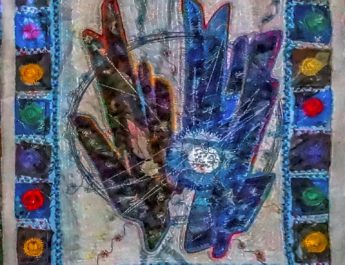Acts 1:15-17, 21-26
Seventh Sunday of Easter B
15 In those daysA PeterB stood upC
A “days” = hemera. Perhaps from hemai (to sit). This is day, time, or daybreak.
B“Peter” = Petros. Related to petra (large rock that is connected and or projecting like a rock, ledge, or cliff; can also be cave or stony ground). This is Peter, a stone, pebble, or boulder.
C “stood up” = anistemi. From ana (upwards, up, again, back, anew) + histemi (to make to stand, place, set up, establish, appoint, stand by, stand still, stand ready, stand firm, be steadfast). This is to raise up, rise, appear. It is to stand up literally or figuratively. Can also mean to resurrect.
amongD the brothersE and sisters (together the crowdF numberedG
D “among” = en + mesos. Literally, “in the midst of.” Perhaps from meta (with among, behind, beyond; implies a change following contact or action). This is middle, among, center, midst.
E “brothers” = adelphos. From a (with, community, fellowship) + delphus (womb). This is a brother in a literal or figurative sense. It is also used of another member of the Church.
F “crowd” = ochlos Perhaps from echo (to have, hold, possess). This is a crowd, the common people, a rabble. Figuratively, it can refer to a riot.
G “numbered” = eimi…onoma. Eimi is to be, exist. Onoma may be from ginosko (know, recognize, learn from firsthand experience). This is a name, authority, cause, character, fame, reputation. The name was thought to include something of the essence of the person so it was not thought to be separate from the person.
about one hundredH twentyI persons) and said,J 16 “KBrothers and sisters, the scriptureL
H “one hundred” = hekaton. 17x in NT. This is hundred literal or figurative.
I “twenty” = eikosi. 11x in NT. This is twenty.
J “said” = eiron. This is to speak say, answer, command.
K {untranslated} = aner. This is man, male, husband, or fellow. It can also refer to an individual.
L “scripture” = graphe. From grapho (to write). This is literally writing, a document. In the New Testament, this is always used for scripture.
had to beM fulfilled,N which the HolyO SpiritP
M “had to be” = dei. From deo (to tie, bind, compel; declare unlawful). This is what is necessary or proper. It is what is needed or what one should do – a duty or something inevitable. This refers to something absolutely necessary.
N “fulfilled” = pleroo. From pleres (to be full, complete, abounding in, occupied with). This is to fill, make full or complete. Properly, this is filling something up to the maximum extent that it can be filled – an appropriate amount for its individual capacity. So, this is used figuratively for furnish, influence, satisfy, finish, preach, perfect, and fulfill.
O “Holy” = Hagios. From hagnos (holy, sacred, pure ethically, ritually, or ceremonially; prepared for worship, chaste, unadulterated, pure to the core; undefiled by sin; figurative for innocent, modest, perfect). God is totally different from humanity and thus set apart. That which is consecrated to worship God (elements of worship) or to serve God (as the saints) are holy because they are now set apart for God’s purposes. Holy because important to God. This is sacred physically, pure. It can be morally blameless or ceremonially consecrated.
P “Spirit” = Pneuma. From pneo (to blow, breathe, breathe hard). This is wind, breath, or ghost. A breeze or a blast or air, a breath. Figuratively used for a spirit, the human soul or part of us that is rational. It is also used supernaturally for angels, demons, God, and the Holy Spirit. This is where pneumonia comes from.
throughQ DavidR foretoldS concerning Judas,T
Q {untranslated} = stoma. Perhaps from tomoteros (sharp, keener); from temno (to cut). This is mouth, speech, language, the tip of a sword, an opening in the ground.
R “David” = Dauid. From Hebrew David (David); from the same as dod (beloved, love, uncle); the root may mean to boil, which is used figuratively to describe love. So, this implies someone you love such as a friend, a lover, or a close family member like an uncle. David’s name likely means something like “beloved one.”
S “foretold” = proepo. 1x in NT. From pro (before, first, in front of, earlier) + epo (to answer, bring word, command). This is to say before, predict, foretell.
T “Judas” = Ioudas. From Hebrew Yehudah (Judah, son of Jacob, his tribal descendants, a name for the southern kingdom. Literally, it means praised); probably from yadah (to throw one’s hands into the air in a gesture of praise); from yad (hand). This is Judah or Judas, meaning praised.
who becameU a guideV for those who arrestedW Jesus,X
U “became” = ginomai. This is to come into being, to happen, become, be born. It can be to emerge from one state or condition to another or is coming into being with the sense of movement or growth.
V “guide” = hodegos. 5x in NT. From hodos (way, road, path, or journey; can imply progress along a route) + hegeomai (to think, suppose, have an opinion; to lead the way, what comes in front or first, initial thought, high esteem or authority; one who commands in an official capacity); {from ago (lead, bring, carry, drive, go)}. This is leader or guide. It can be used figuratively for a teacher.
W “arrested” = sullambano. 16x in NT. From sun (with, together with) + lambano (active acceptance/taking of what is available or what has been offered; emphasizes the choice and action of the individual). This is to take, take part in, conceive, help. It can also be clasp or seize as to arrest or take hold of someone.
X “Jesus” = Iesous. From Hebrew Yehoshua (Joshua, the Lord is salvation); {from YHVH (proper name of the God of Israel; the self-existent and eternal one); {from havah (to become) or from hayah (to come to pass, become, be)} + yasha (to deliver, defend, help, preserve, rescue; properly, to be open, wide or free, which implies being safe. So, in a causative sense, this is to free someone)}. This is Jesus or Joshua in Greek – the Lord saves or the Lord is salvation.
17 for he wasY numberedZ among us and was allottedAA his shareBB in this ministry.”CC
Y “was” = eimi. Same as “numbered” in v15. See note G above.
Z “numbered” = katarithmeo. 1x in NT. From kata (down, against, according to) + arithmeo (to number of count); {from arithmos (a number or total that has been counted to together); from airo (to lift up or raise in a literal or figurative sense; figuratively, to exalt oneself)}. This is to number with, count, reckon together.
AA “allotted” = lagchano. 4x in NT. This is to choose by lot, to receive, determine.
BB “share” = kleros. 12x in NT. Perhaps from klero (casting a lot) or from klao (to break in pieces as one breaks bread). This lot, portion, heritage. It is that share assigned to you. It could also refer to a lot used to determine something by fate, chance, or divine will.
CC “ministry” = diakonia. Perhaps from dia (through, across to the other side, thoroughly) + konis (dust) OR from dioko (to chase after, put to flight; by implication, to persecute or to purse like a hunter after its prey; this can be earnestly pursue or zealously persecute) {related to dio (put to flight)}. This is service, ministry, attending someone, service. It can mean serving someone at a table or otherwise as their servant/slave. It is also used for people who serve/minister in temples, as well as the work of Christian ministry. Figuratively, this word can mean money given for charity. This shares a root with “deacon” and is where the word “diaconate” comes from.
21 “DDSoEE one of the menFF who have accompaniedGG us during allHH the timeII
DD {untranslated} = dei. Same as “had to be” in v16. See note M above.
EE “so” = oun. This is therefore, then, but, now.
FF “men” = aner. Same as {untranslated} in v16. See note K above.
GG “accompanied” = sunerchomai. From sun (with, together with) + erchomai (to come, go). This is to go with, assemble, leave together with, cohabit.
HH “all” = pas. This is all or every.
II “time” = chronos. Time in the chronological sense, quantitative time or a duration of time.
that the LordJJ Jesus went inKK and outLL among us,
JJ “Lord” = Kurios. From kuros (authority, supremacy). This is a respectful address meaning master or sir. It refers to one who has control or power greater than one’s own. So, it was also applied to God and Jesus as Master or Lord.
KK “went in” = eiserchomai. Related to “accompanied” in v21. From eis (to, into, for, among) + erchomai (see note GG above). This is to go in in a literal or figurative sense.
LL “out” = exerchomai. Related to “accompanied” & “went in” in v21. From ek (from, from out of) + erchomai (see note GG above). This is to go out, depart, escape, proceed from, spread news abroad.
22 beginningMM from the baptismNN of JohnOO until the day when he was taken upPP from us—
MM “beginning” = archomai. From archo (to rule, begin, have first rank or have political power). This is to begin or rule.
NN “baptism” = baptisma. From baptizo (to submerge, wash, or immerse; used specially for baptism); from bapto (to dip or dye; to entirely cover with liquid, to stain). This is dipping or sinking. Also, the rite of baptism.
OO “John” = Ioannes. Related to “Jesus” in v16. From Hebrew yochanan (Johanan); from Yehochanan (“the Lord has been gracious”); {from YHVH (see note X above) + chanan (beseech, show favor, be gracious; properly, to bend in kindness to someone with less status). This is John, meaning “the Lord has been gracious.”
PP “taken up” = analambano. Related to “arrested” in v16. 13x in NT. From ana (up, again, anew) + lambano (see note W above). This is to take up, lead away, raise. It is often used of the ascension.
oneQQ of these must become a witnessRR with us to his resurrection.”SS
23 So they proposedTT two,UU
QQ “one” = heis. This is one, a person, only, some.
RR “witness” = martus. This is a witness whether having heard or seen something. It refers to a witness literally, judicially, or figuratively. By analogy, this is a martyr. This is also where the word “martyr” comes from.
SS “resurrection” = anastasis. Related to “stood up” in v15. From anistemi (see note C above). This is literally standing up or standing again. It is used figuratively for recovering a spiritual truth. It can be raising up, rising, or resurrection.
TT “proposed” = histemi. Related to “stood up” in v15 & “resurrection” in v22. See note C above.
UU “two” = duo. This is two or both.
JosephVV calledWW Barsabbas,XX
VV “Joseph” = Ioseph. From Hebrew Yoseph (he increases; Joseph); from yasaph (to add, increase, continue, exceed). This is Joseph, meaning “he increases.”
WW “called” = kaleo. Related to keleuo (to command, order, direct); from kelomai (to urge on). This is to call by name, invite, to name, bid, summon, call aloud.
XX “Barsabbas” = Barsabbas. 2x in NT. From Aramaic bar (son, age); {Aramaic corresponding to ben (son literal or figurative; also, grandson, subject, nation); from banah (to build or obtain children)} + perhaps Aramaic tseba (to desire, be pleased); {corresponding to Hebrew tsaba (to wage war, serve, assemble, fight, perform, muster, wait on) OR from tsabah (to swell, grow, amass like an army)} OR from bar (see above) + seba (imbibe) OR from bar (see above) + shaba (to swear, make an oath). This is Barsabbas, meaning “son of Sabbas” or “man of the host” or “one of the drunks” or “son of an oath” or “man of war” or “son of a drunk.” See https://www.abarim-publications.com/Meaning/Barsabbas.html
who was also knownYY as Justus,ZZ and Matthias.AAA
YY “known” = epikaleo. Related to “called” in v23. From epi (on, upon, among, what is fitting) + kaleo (see note WW above). This is to call on, appeal to, worship, invoke for help.
ZZ “Justus” = Ioustos. 3x in NT. From Latin Justus (Justus); from iustus (righteous, legal, suitable, exact, direct). This is Justus, meaning “just.” See https://www.abarim-publications.com/Meaning/Justus.html & https://en.wiktionary.org/wiki/Justus
AAA “Matthias” = Matthias. Related to “Jesus” in v16 & “John” in v22. 2x in NT. From Maththias (Matthias); from Hebrew Mattathias (Mattathias, “gift of the Lord); from Hebrew Mattithyahu (Matthew, “gift of the Lord”); {from mattanah (gift, offering of sacrifice, present, bribe); {from mattan (gift, reward, to give); from natan (to give, put, set, offer; to give literally or figuratively)} + YHVH (see note X above)}}. This is Matthias or Mattithyah, meaning “gift of the Lord.” See https://www.abarim-publications.com/Meaning/Matthias.html
24 Then they prayedBBB and said, “Lord, you know everyone’sCCC heart.DDD
BBB “prayed” = proseuchomai. From pros (advantageous for, at, toward) + euchomai (to wish, make a request, pray). This is to pray or pray for, to worship or supplicate. It is more literally exchanging one’s own wishes for God’s.
CCC “everyone’s” = pas. Same as “all” in v21. See note HH above.
DDD “know…heart” = kardiognostes. Related to “numbered” in v15. 2x in NT. From kardia (the heart, but figuratively mind, character, inner self, will, intention, thoughts, feelings; the center of something; only used figuratively in the Bible) + gnostes (expert, a knower); {from ginosko (see note G above)}. This is one who knows hearts i.e. the inner life, moral convictions. Used of God both times.
ShowEEE us which one of these two you have chosenFFF 25 to takeGGG the placeHHH in this ministry
EEE “show” = anadeiknumi. 2x in NT. From ana (up, again, back, among, anew) + deiknumi (to show, point out, exhibit; figurative for teach, demonstrate, make known). This is to show, appoint, exhibit, indicate.
FFF “chosen” = eklego. From ek (from, from out of) + lego (to say, speak, tell). This is to choose, select.
GGG “take” = lambano. Related to “arrested” in v16 & “taken up” in v22. See note W above.
HHH “place” = topos. This is a place or region. It is a smaller space that can only hold a limited number of people whereas chora is a larger place. Figuratively it could be an opportunity.
and apostleshipIII from which Judas turned asideJJJ to goKKK to his ownLLL place.”
III “apostleship” = apostole. Related to “stood up” in v15 & “resurrection” in v22 & “proposed” in v23. 4x in NT. From apostello (to send, send away, send forth as a messenger, to commission); {from apo (from, away from) + stello (to set, arrange, prepare, provide for); {probably from histemi (see note C above)}}. This is commission or the responsibilities of an apostle.
JJJ “turned aside” = parabaino. 3x in NT. From para (beside, by, in the presence of) + the same as basis (step, hence foot; a pace); {from baino (to walk, to go)}. This is literally to go past. So it can be to violate, break, or transgress. It is intentionally stepping across a boundary that one is aware of. It can also mean to turn aside or depart.
KKK “go” = poreuomai. From poros (ford, passageway). This is to go, travel, journey, or die. It refers to transporting things from one place to another and focuses on the personal significance of the destination.
LLL “own” = idios. This is something that belongs to you or that is personal, private, apart. It indicates a stronger sense of possession than a simple possessive pronoun. This is where “idiot” comes from (denoting someone who hasn’t had formal training or education and so they rely on their own understanding).
26 And they castMMM lotsNNN for them, and the lot fellOOO on Matthias, and he was addedPPP to the elevenQQQ apostles.RRR
MMM “cast” = didomi. To give, offer, place, bestow, deliver. This is give in a literal or figurative sense.
NNN “lots” = kleros. Same as “share” in v17. See note BB above.
OOO “fell” = pipto. This is to fall literally or figuratively.
PPP “added” = sugkatapsephizomai. 1x in NT. From sun (with, together with) + kata (down, against, throughout) + psephizo (to count or calculate; it refers to the stones as counters); {from psephos (smooth pebble; used to cast a vote or as a counter); from the same as psallo (see note CLI above) or from pselaphao (to touch, feel, or grope about; a light touch to explore, discover, or confirm something with physical contact; figuratively, to search for); {probably from psallo (to twang, play, sing psalms, pluck a stringed instrument such as a harp); {from psao (to rub)} + haphao (to handle)}}. This is to enroll among, condemn with, add.
QQQ “eleven” = hendeka. Related to “one” in v22. 6x in NT– all referring to the apostles minus Judas. From heis (see note QQ above) + deka (ten). This is eleven.
RRR “apostles” = apostolos. Related to “stood up” in v15 & “resurrection” in v22 & “proposed” in v23 & “apostleship” in v25. From apostello (see note III above). This is a messenger – someone sent out on a mission as an envoy or delegate. It can also refer to someone set at liberty. Generally, this is a messenger who is meant to be a representative of the one who sent them. They are thus, set apart on a mission literally or figuratively.
Image credit: Stained glass window at Saint Matthias Church in Santo Tomas, Pampanga, Philippines. Photo by Judgefloro, 2015.




